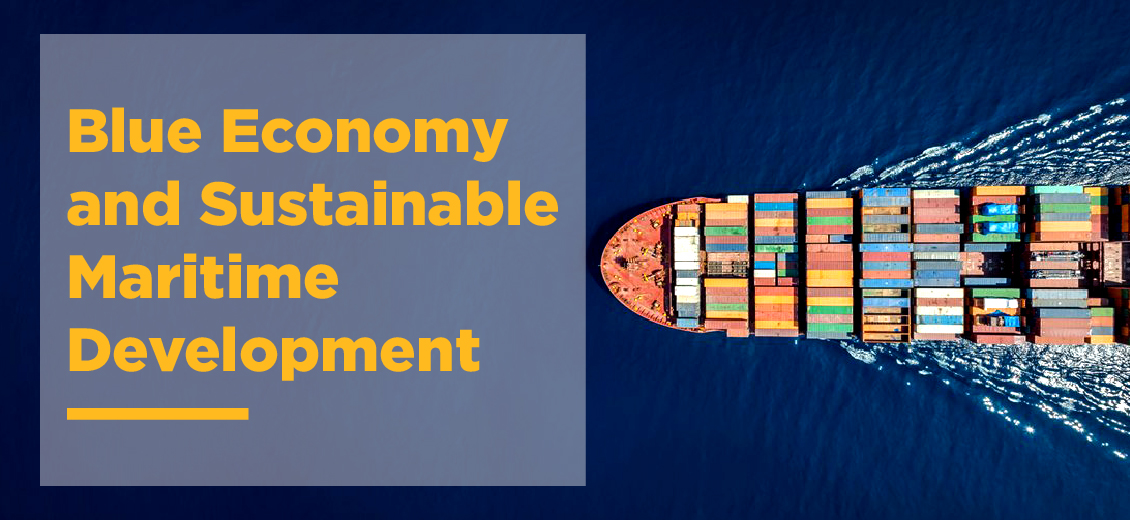Blue Economy and Sustainable Maritime Development
Blogs Home
- 14 Jun 2023

The concept of the "Blue Economy" has gained significant attention in recent years as a means to promote sustainable development and harness the potential of the world's oceans and coastal areas. It represents a shift from traditional ocean-based economic activities that focused solely on extraction and exploitation to a more holistic and sustainable approach that integrates conservation, responsible resource utilization, and economic growth. This blog will delve into the key aspects of the Blue Economy and its role in promoting sustainable maritime development, encompassing fisheries and aquaculture, International Legal Framework, renewable energy, marine biotechnology, tourism, coastal development, and governance.
What is Blue Economy?
Blue Economy represents a burgeoning idea that advocates for the sustainable utilization, innovation, and stewardship of our ocean and its invaluable 'blue' resources. In the traditional 'business-as-usual' approach, nations have historically developed their ocean-based economies by exploiting maritime and marine resources, such as shipping, commercial fishing, and the extraction of oil, gas, and minerals. However, the long-term implications of these activities on the health and productivity of these resources and the intricate ecosystems they inhabit are often overlooked. The 'blue economy' offers a more comprehensive vision that encompasses economic growth in a manner that is sustainable and does not harm other sectors. Much like the 'green economy,' the blue economy seeks to harmonize human well-being, social equity, and environmental sustainability.
It not only embraces economic opportunities but also safeguards and nurtures intangible 'blue' resources, including traditional ways of life, carbon sequestration, and coastal resilience. By doing so, it aims to assist vulnerable states in mitigating the catastrophic impacts of poverty and climate change.
The global ocean economy is currently valued at approximately $1.5 trillion annually, ranking it as the world's seventh-largest economy. Projections indicate that it will double by 2030, reaching $3 trillion. The total value of ocean assets, also known as natural capital, has been estimated at $24 trillion.
Small island states, despite their limited land mass, possess extensive oceanic resources at their disposal, presenting a significant opportunity to bolster their economic growth and address challenges such as unemployment, food insecurity, and poverty. Nevertheless, they are also the most susceptible to the degradation of marine resources, making it crucial to prioritize their protection.
Sustainable Fisheries and Aquaculture
Fisheries and aquaculture are essential components of the Blue Economy, providing food security, livelihoods, and economic opportunities worldwide. However, overfishing, illegal fishing and destructive practices have severely impacted marine ecosystems and depleted fish stocks. Sustainable fishing practices, such as ecosystem-based management, reducing bycatch, and implementing fishery regulations, are crucial to ensure the long-term health of fish stocks and marine ecosystems. Similarly, responsible aquaculture practices, including proper site selection, waste management, and species diversification, can minimize environmental impacts and promote sustainable seafood production.
Renewable Energy from the Oceans
The oceans hold immense potential as a source of renewable energy. Technologies such as offshore wind, tidal energy, wave energy, and ocean thermal energy conversion (OTEC) can contribute significantly to global energy production while reducing greenhouse gas emissions. By investing in research, development, and infrastructure, countries can harness the power of the oceans to meet their energy needs sustainably, reducing reliance on fossil fuels and mitigating climate change. The development of these technologies not only contributes to the Blue Economy but also creates job opportunities and stimulates economic growth.
Marine Biotechnology and Pharmaceuticals
Marine biotechnology involves the use of marine organisms and their products for various applications, including medicine, agriculture, and industry. The oceans are a treasure trove of bioactive compounds with immense potential for drug discovery and development. Sustainable utilization of marine resources for biotechnology purposes can lead to the discovery of novel drugs, agricultural innovations, and industrial materials, while ensuring the conservation of marine biodiversity. This emerging field presents opportunities for economic growth, technological advancements, and addressing global health challenges.
Sustainable Tourism and Coastal Development
Coastal and marine tourism is a significant economic driver in many regions. However, unregulated tourism can have detrimental effects on fragile coastal ecosystems, leading to habitat destruction, pollution, and cultural degradation. Sustainable tourism practices aim to minimize negative impacts on coastal ecosystems, conserve biodiversity, respect local cultures, and provide economic benefits to communities. It's best to promote sustainable tourism to protect fragile coastal environments, foster community engagement, and create quality job opportunities while preserving natural and cultural heritage for future generations.
Blue Economy Governance and Collaboration
Effective governance and international collaboration are essential for the successful implementation of the Blue Economy concept. Governments, international organizations, academia, industry, and civil society need to work together to develop policies, regulations, and strategies that promote sustainable maritime development. Encouraging public-private partnerships, sharing best practices, and investing in capacity building and research are crucial steps towards a more sustainable and inclusive Blue Economy. Also, promoting knowledge exchange, technology transfer, and financial support to developing countries can enhance their capacity to participate in the Blue Economy.
Tips to improve potential for a prosperous future
- Embrace the 'blue economy' concept
Recognize the importance of sustainable exploitation, innovation, and stewardship of ocean resources to ensure a prosperous future for maritime development. This holistic vision integrates economic growth, environmental sustainability, and social equity.
- Promote sustainable practices
Encourage nations to adopt sustainable practices in maritime activities such as shipping, commercial fishing, and offshore resource extraction. Implement regulations and guidelines that prioritize resource conservation, ecosystem protection, and minimizing environmental impact.
- Invest in research and innovation
Support research and development efforts focused on sustainable technologies and practices in maritime industries. Encourage innovation in renewable energy generation, eco-friendly vessel designs, efficient shipping logistics, and sustainable aquaculture.
- Strengthen international cooperation
Foster collaboration between nations, organizations, and stakeholders to address common challenges in maritime development. Share best practices, exchange knowledge, and promote joint initiatives for sustainable resource management, pollution control, and climate change adaptation.
- Empower coastal communities
Ensure the inclusion and active participation of coastal communities in decision-making processes related to maritime development. Promote sustainable livelihoods, respect traditional practices, and provide opportunities for education and capacity building.
- Enhance ocean governance
Establish effective governance frameworks that regulate and monitor maritime activities. Strengthen enforcement mechanisms to combat illegal, unreported, and unregulated fishing practices. Implement integrated coastal zone management approaches to balance economic activities with conservation goals.
- Foster public-private partnerships
Encourage collaboration between the public and private sectors to drive sustainable maritime development. Facilitate investments in sustainable infrastructure, marine technology, and eco-tourism initiatives that promote economic growth while safeguarding the environment.
- Support small island states
Recognize the unique challenges faced by small island states in maritime development. Provide financial assistance, technical support, and capacity building to help these nations harness their ocean resources sustainably, addressing issues such as unemployment, food insecurity, and vulnerability to climate change.
- Raise awareness and promote education
Educate the public about the significance of sustainable maritime development and the role individuals can play in protecting ocean resources. Foster environmental literacy, promote responsible tourism, and support initiatives that raise awareness about the importance of healthy oceans.
- Monitor and evaluate progress
Establish mechanisms to monitor and evaluate the progress of sustainable maritime development initiatives. Regularly assess the effectiveness of policies, strategies, and actions taken to ensure continual improvement and identify areas that require further attention and intervention.
International Legal Framework
- UN Treaty on the High Seas
The UN Treaty on the High Seas is an international agreement that aims to protect and sustainably manage marine biodiversity in areas beyond national jurisdiction. These areas, known as the high seas, make up a significant portion of the world's oceans and are vital for supporting marine life and ecosystems. The treaty, which is a result of the 1958 Geneva Convention on the High Seas, represents a collective effort by UN member states to address the pressing need for the conservation and responsible use of these valuable marine resources. By implementing the treaty, countries are working towards achieving the global target of protecting 30% of the oceans by 2030, as agreed upon at the UN CBD COP15.
- UNCLOS and its relevance to the Blue Economy
The United Nations Convention on the Law of the Sea (UNCLOS) serves as a crucial international legal framework for governing the world's oceans. UNCLOS, established in 1982, holds significant relevance to the Blue Economy, which focuses on the sustainable use of ocean resources for economic growth, livelihood improvement, and environmental preservation.
- International Regulations and Agreements for Sustainable Maritime Development
UNCLOS outlines key principles such as the precautionary approach, ecosystem-based management, and the duty to protect the marine environment. These principles guide the formulation of regulations and agreements addressing issues like overfishing, pollution, and the conservation of vulnerable marine ecosystems.
- Maritime Boundaries, Jurisdiction, and Rights of Coastal States
UNCLOS establishes rules regarding maritime boundaries, jurisdiction, and the rights of coastal states. It outlines the delimitation of territorial seas, the establishment of exclusive economic zones (EEZs), and the rights of innocent passage through international straits. These provisions ensure the peaceful coexistence and equitable utilization of marine resources among coastal states. UNCLOS also addresses the establishment of baselines and continental shelves, clarifying the extent of national jurisdiction over marine areas.
Case Studies
One noteworthy case study is the Seychelles, a small island nation in the Indian Ocean. The Seychelles has implemented innovative measures to protect its marine environment and promote sustainable tourism. Through the establishment of marine protected areas and sustainable fishing practices, the country has preserved its rich biodiversity and attracted eco-conscious travelers. The Seychelles' Blue Economy strategy has become a model for other nations seeking to balance economic development with conservation efforts.
Another inspiring example is Norway, known for its sustainable fisheries management. The country has implemented strict regulations and quotas, ensuring the long-term viability of its fishing industry while safeguarding fish stocks. Norway's success in sustainable fisheries has been achieved through collaboration between government, industry, and local communities, fostering a shared commitment to responsible resource management.
Understanding the interconnectedness between healthy oceans, economic prosperity, and social well-being is crucial for realizing the full potential of the Blue Economy. By prioritizing conservation, adopting sustainable fishing practices, promoting renewable energy sources, and developing responsible coastal infrastructure, we can create a harmonious balance between economic development and the preservation of our precious marine resources.
Sources
https://www.un.org/depts/los/convention_agreements/texts/unclos/unclos_e.pdf
https://thecommonwealth.org/bluecharter/sustainable-blue-economy
https://www.drishtiias.com/daily-updates/daily-news-analysis/un-treaty-on-the-high-seas
Poonam Sharma

Poonam Sharma is a graduate in civil engineering. She is an old soul who loves music, dance, art! Apart from these, she likes to immerse herself in writing, singing and sketching; this is how she expresses art.
Blogs Home



